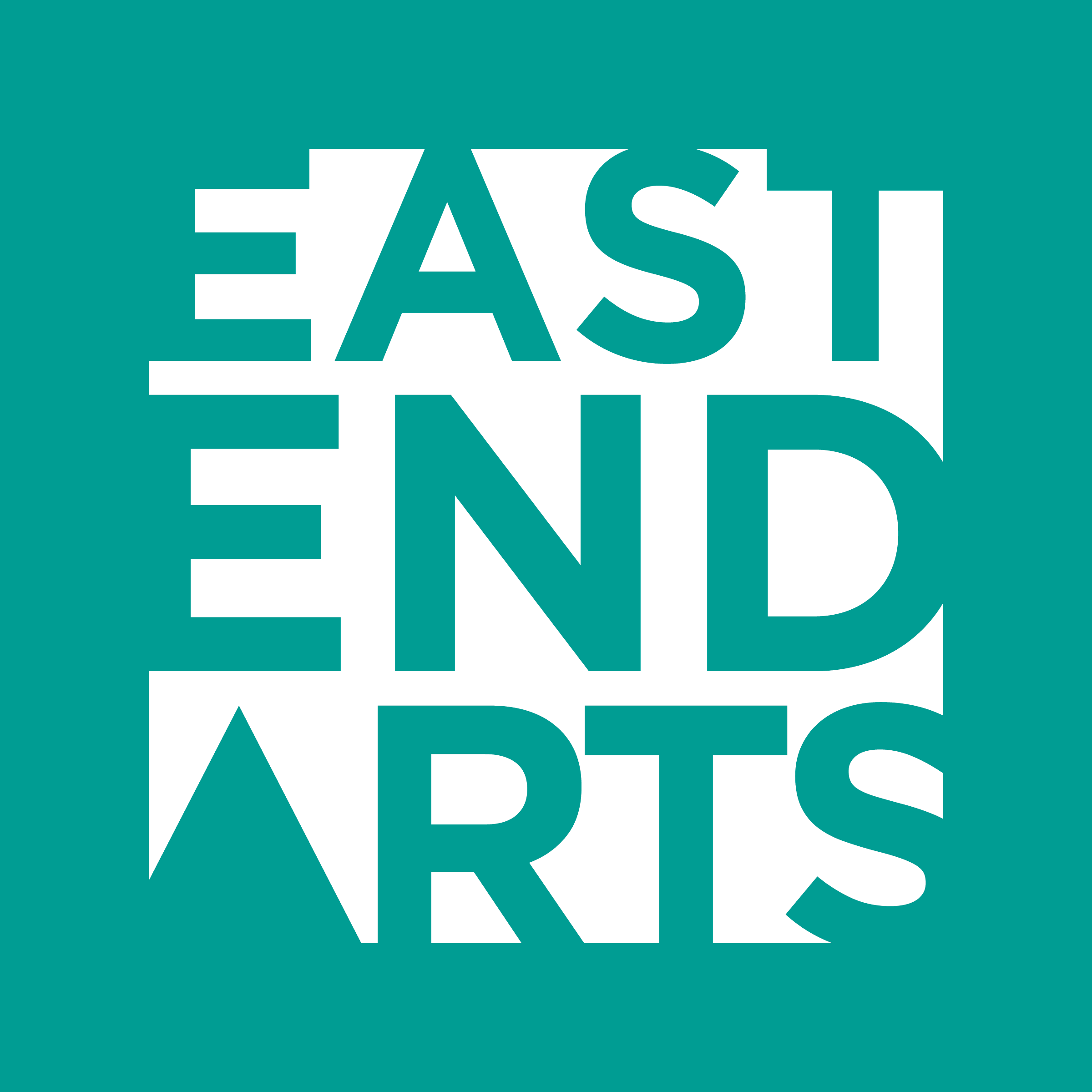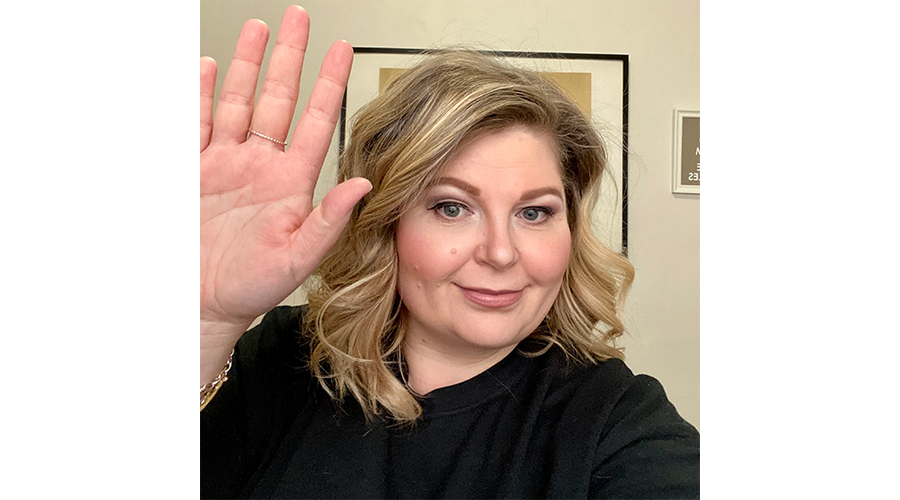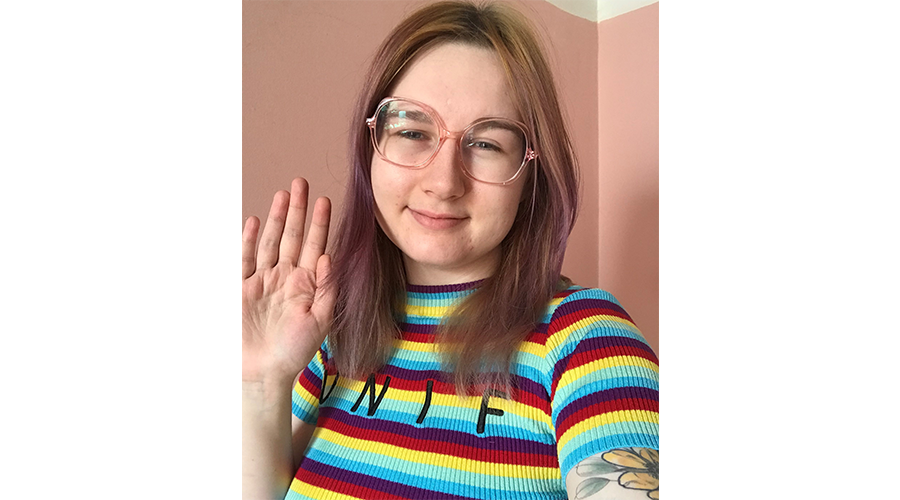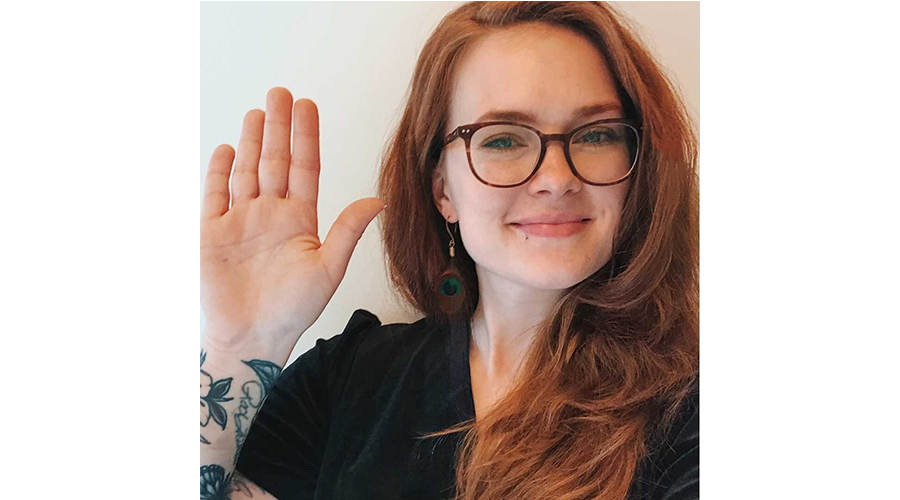This month on the #EEABlog, our Communications Manager, Chelsea, sat down with some local women who work in the arts sector of Toronto to hear their thoughts and ideas around this year’s theme for International Women’s Day: #ChooseToChallenge!
*Banner image by Lindsey LaMont*
Q&A Moderated and transcribed by Chelsea Cameron-Fikis. Assisted by Sarah Devine.
#ChooseToChallenge: An Intro
At times it’s still hard to be a woman in our modern world. I [Chelsea] turned thirty this past January, and for many years I held onto the thought that, “Once I turn thirty, I’ll have made it.” That is, all my insecurities will finally melt away, I’ll naturally receive the respect and credit that I deserve from colleagues and those around me, and generally things won’t feel as hard and complicated just because I’m a woman.
Of course, hindsight is 20/20. As it turns out the infamous boys’ club exists no matter what sector you work in or environment you’re a part of; the gender pay gap continues to exist, particularly for women of color; and gendered stereotypes remain largely intact: women are still expected to look and act a certain way as “professionals”, “mothers”, etc. True gender equality remains elusive, even in the 21st century.
And so, for this International Women’s Day, which embraces the theme #ChooseToChallenge this year, the EEA team and I wanted to do something special. In a world where women continue to struggle against the infinite number of tentacles of the Patriarchy we asked ourselves, “What can we do to create some woman-centered space, and help to collaborate and lift up some fellow women in the arts sector?” It’s no secret that women are often encouraged to compete against one another and tear each other down, (largely because of the scarcity of options the further up we go). But, it’s also no secret that women who empower other women tend to be more successful; there is real power in embracing collaboration and support. So, we decided to have an online chat with some local leaders to talk about what it’s like to be women who work in the arts sector of Toronto, professionally and personally. I hope you enjoy reading it as much as I enjoyed moderating and transcribing it. Shout out to my awesome Intern, Sarah, for helping me pull it together.
This online chat included Sapphira C., Toronto, Beach resident who is an Architect, Artist, Performer & Activist with over 15 years of experience in the Architecture industry and has her own Architectural Practice; Jaspreet Sandhu, the current VP of Development for Massey Hall and Roy Thompson Hall, and self-taught artist who went to film school and worked at TIFF for the past 11 years; Shana Hillman, the current Executive Director of East End Arts with over 20 years’ experience in community outreach, evaluation, government relations and program development; Sarah Devine, the current Communications & Marketing Intern for East End Arts who is completing her Bachelor of Arts in Creative Industries from Ryerson University, specializing in Visual Culture; and myself, Chelsea Cameron-Fikis, current Communications Manager with East End Arts, and practicing Writer and Visual Artist.
Q1: Reflecting on your own experiences, what kinds of changes (good and bad) have you seen on gender equality?
Sapphira’s Answer:
So I started my undergraduate degree in architecture 20 years ago, and when I started, school it was pretty equal in terms of male and female enrolment. But then after the first year, they only accept about 75 architectural students and half or more of the women drop out. So there tends to be more of an equal balance in school than there is in the workforce. Men still make more money than women in the industry, even though it’s something that’s not really discussed a lot, but personally, it’s known. Now a lot of women are starting to come together to discuss these inequalities in architecture and reveal them.
In my burlesque practice, the biggest difference in the 11 years from when I started to now is body positivity. When I started in burlesque honestly slut shaming was totally around. But I think now the shift has become so apparent. Body positivity on social media is huge now, right? If I decide to wear a crop top and I’m not skinny, like it’s cool, and there’s complete body acceptance. So that’s very relevant in burlesque as well.
Jaspreet’s Answer:
I think one of the biggest shifts has been women being able to talk about their experiences. That was definitely one of the biggest shifts in the film industry when I worked at TIFF when my mentor, (and my boss who trained me), Maxine Bailey and I came up with this campaign to share more stories of women through film (it came out a couple months before the Harvey Weinstein scandals). That whole campaign was a career highlight because it was all about doing what we could to amplify women in the sector. The wage thing is another real one that still exists. There was an article I read recently that said the wage gap has only gone up on average about 10 cents, and for racialized women it’s even smaller. We’ve got to start talking about our wages more openly, and also about what it means for somebody to have the same title. Like what it means for a woman to be a Director with six different reports, versus a man seems to be different in what is expected and the workload sometimes.
Shana’s Answer:
For me I’ve always been in smaller organizations with the largest organization being the YWCA, Toronto. The Y was very special, because it was all about women. But my experience has always been that the non-profit arts sector is sort of a pink collar industry: all women. But then something I have noticed is if you look at larger arts organizations, or funding bodies, at the top level there’s still a whole bunch of white men leading, and then there’s also not a good process in place for succession planning. There are lots of organizations where we’ve got, you know, lots of really well meaning middle aged white ladies, (which I totally recognize I am one of) in that next level of leadership, so there’s just something about the succession planning that needs to happen and change. We need to start thinking about that. And I think that the pandemic has kind of brought that up with a lot of organizations as well, you know, because it exacerbated all kinds of problems, and then we see who’s at the helm of these organizations.
Sarah’s Answer:
Honestly, yeah, I definitely think the higher up you go, the more the homogenous the whole structure is. My program is Creative Industries at Ryerson, which is very arts management focused, and even though there are like 10 men in a class of 100, it’s those few men taking up most of the airtime. I’m sure you can all relate to that from various Zooms over the past year.
Q2: What do you believe are some of the biggest challenges that women are facing in the arts sector of Toronto today?
Sapphira’s Answer:
I think a challenge for women but also for artists in general is compensation. Like for me, I have my own architecture company, and when clients approach me the biggest challenge that I have is figuring out how I’m going to structure my fees. Like, I think “am I overcharging?” “Will these clients retain me if I charge too much?” Whereas I think for men, this isn’t even a factor for them. Like I asked a guy I was doing consulting work with for some advice on how to come up with fees for clients, and it turns out there really isn’t any help in regards to that, like at all – it’s really astounding. Even our governing body the Ontario Association of Architects won’t offer that kind of advice.
Another challenge is when you become a mother, and like childcare… it’s a whole mindf*ck trying to navigate it all. The pandemic has highlighted this issue, and there’s a lot of articles that have emerged about how mothers are getting the brunt of it. Being a creative person, and a mother, I’m just appalled and surprised that there aren’t more supports in general for women.
Jaspreet’s Answer:
I think it goes back to that trust in your skillset. In my filming experience, I always reduced not being able to find work down to the fact that I wasn’t connected enough, or that I was new to the industry, or that I came from a working class background and was a racial minority. Then I would go into very dark places where I’d think I’m not skilled enough, and I need to be super, undeniably talented and desired in my artistic ability in order to get anywhere. And so, I abandoned film because I was tired of explaining why I’m making something and trying to hustle. I’m somebody who dropped out and stopped doing many of the creative elements of film that I was trained in, and started doing more on the admin side, which I think is another huge thing. Women typically do more of the admin work for organizations. The only reason why I think I have grown in my career is because I reported to an incredible black woman who was at the executive table, and like, pulled me up with her. Women having an advocate or a sponsor is so important.
Shana’s Answer:
I think the thing for me is around wages, and just being confident and competent enough to ask for it, and not worrying about being perceived as pushy. I don’t think a man’s ever going to be called pushy because he asked for something he needed or wanted. And so there’s that, and then I also want to tap on to what you said, Jaspreet. I also had women mentors in my life that if I didn’t have them, I wouldn’t be doing what I’m doing right now, and I wouldn’t be where I am. Those women dragged me up, pulled me along and made space and invited me to come to tables when I was so junior, and I had no place being at those tables. Even if it was just so that it looked like she wasn’t the only person at the table when we were going to meet with a funder or whoever, the opportunity to be in those rooms were so important.
Sarah’s Answer:
Jumping off of what Jaspreet said about leaving the creative side of the film industry, I definitely find that a lot of people in film are there because their parents are in the industry or are financing them–it’s very network-based, which makes it so much harder to break in. And I see a lot more women–especially marginalized women–be forced to pivot like, “Well, nobody’s picking up my screenplay, so I’m just going to go into this instead”. So yeah, that difference is definitely palpable in film for sure.
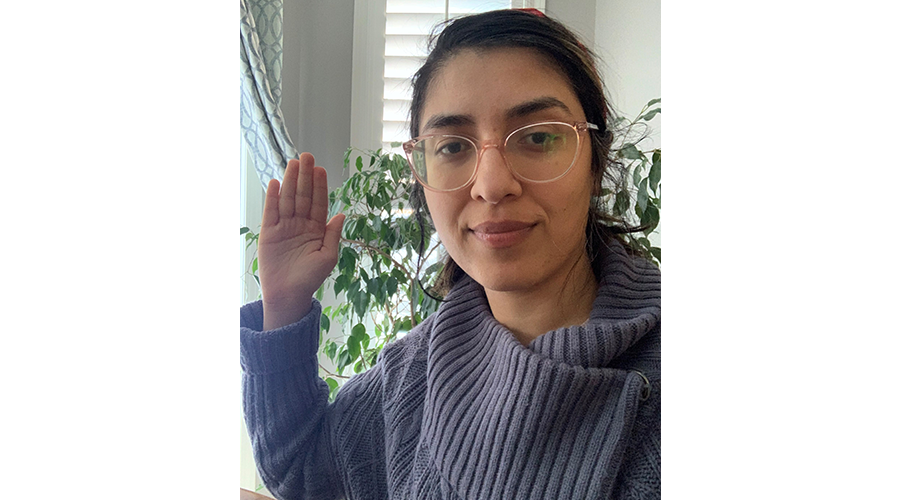
Jaspreet Sandhu, Vice President Of Development at The Corporation of Massey Hall and Roy Thomson Hall.
Q3: Given that the 2021 theme for International Women’s Day is #ChooseToChallenge, what are you doing right now to challenge the status-quo and advocate for gender equality?
Sapphira’s Answer:
I’ve always been a rebel at heart since I was a child, and I think a lot of artists are rebels, right? So, I’m always challenging the notion of what, who, and how women should act in workplaces to be taken seriously. I think that’s the biggest thing for me: challenging those ideas of like, “What does an architect look like?” or “What does an artist look like?”
Jaspreet’s Answer:
I’ve been trying to be more vocal about my experiences with others, because I’ve been so quiet about them, and I’ve let them burn me in a certain way. I’ve also been volunteering with this group called Pink Attitude Evolution, which is doing a national study about South Asian women right now. South Asian women are the biggest minority group in Canada, which I did not know, and they’re also among the most educated groups, which I also did not know. These women have Bachelor’s degrees and Master’s degrees and up, and yet they are among the most unemployed right now. So I’ve been trying to channel a little bit more of what I know into volunteer work. This study is a big passion project of mine, so getting that off the ground and getting as many South Asian women completing the survey will be next.
Shana’s Answer:
I think for me I want to continue to challenge and call out gender bias and equity, but it’s such a delicate dance. We’re all so beholden to funders and fund development. And there’s the very real reality of funder fragility, you know, from these middle-aged white men in positions of power, whether it be the government or foundations or corporate sponsors. There’s also this idea when you go to those fundraising meetings of, “be nice, be friendly, smile, don’t talk too much, only be gently pushy”. So I think for me, I’m choosing to be pushier, and I’m choosing to not apologize and not immediately backtrack and stand my ground more. 45-year-old Shana wishes she could tell 25-year-old Shana some things about that, both in my personal life, and in my professional life.
Sarah’s Answer:
Honestly it’s been so awesome to listen to all this. Yes, I think especially through the pandemic we’ve really been able to kind of break down things like, “What are professional clothes?” “What is professional hair?” People’s kids are literally in front of the screens, so you can’t really divorce the idea of being a parent from your job. I think embracing all facets of your identity and to honor them is definitely important. Hopefully this will all kick-start some actionable items for the future.
Q4: What kinds of changes do you think we would see if more women occupied leadership positions across our sector and city?
Sapphira’s Answer:
This is an interesting question, because I was listening to your experiences (Jaspreet and Shana’s) of having female mentors, and I was feeling envious. If I only had a female architect mentor who I could speak with about anything and everything, or who would have helped propel me into the industry. I felt pretty alienated in (male-dominated) offices and like I couldn’t trust or confide in people to discuss my experiences. So I just think having more women in leadership completely changes the whole environment, and also, women see things and do things differently. I think women are more apt to do things more flexibly.
But honestly like, I can’t even find the words to say this, because I haven’t seen those examples. For myself, I just hope to show other women that it’s not scary to be in leadership roles. As a black, female in architecture, (I think there’s honestly like five of us in the entire country), there’s clearly still much work to be done there. I’m the first black female architect architecture owned company in Toronto! Wow! Like, we’re a metropolitan city, you know, millions… and I’m just getting started.
Jaspreet’s Answer:
I struggled with this question because like Shana mentioned, the not-for-profit industry has a “pink-collar” component to it. But I have also found the women working in the field to be white women of a particular class who uphold a lot of patriarchy and expectation around class; asking like, “Where do you summer?”, and I’m like, “At home, in the public park over there.” So I think there needs to be diversity amongst women as well.
I will say, it’s a proven fact that when women are at the executive or leadership table, they produce more profit, and they create more collaboration. There are studies about this, because there’s so few women in those leadership tables, (but we know) that the way that they think and the way they approach problems, and the way they own responsibility is at a different level, seen especially during the pandemic. So I think we would see incredible growth, we would see incredible collaboration, and hopefully we would see women lift other women from all sorts of backgrounds up.
Shana’s Answer:
I don’t have much more to add to that other than, you know, just from watching women like Bonnie Henry and Eileen de Villa handle the pandemic: like, just put the women in charge of the whole pandemic, please! The logistics will be done. Get a bunch of women former stage managers, and they will knock this thing out (laughs).
Q5: What advice can you give to women who may just be entering the arts and culture sector of Toronto? What are your suggested steps to success?
Sapphira’s Answer:
I’m going to give advice that I never took myself because I’m only starting to understand this now: create your own community or get involved with a community – because you know, standing with more people you feel stronger. I didn’t do that myself, I didn’t seek out female architect mentors, (partly because there were barely any in the field).
Although I’m not necessarily involved in an architecture community, I am involved in many activist communities, and that’s helped me significantly to bring myself outside of my own thoughts and headspace. But like, another huge thing for me is the idea of putting yourself out there. I would not have put my ideas and my drawings out there 10 years ago, I would have been like, “this is stupid. This is not worthy or valid”. So, keep creating even if you don’t know what the hell it is that you do, it’s so great.
Jaspreet’s Answer:
Speak up for yourself, and remind people of what you’ve accomplished. They’re not going to advocate for you, so in many ways you have to be your own advocate. And I 1,000% agree with you Sapphira about community, and the one thing I’ll add to that is: find those communities in other places as well, like maybe not in the sector. Find community in other places, because it breaks up the cultural logic that you might be so entrenched in. At least that’s what I found, like when I joined different associations, realizing, “Oh, you don’t all think like this”, or, “You all have the same issues as me. And it’s not just me”. So I have found those to be so helpful in getting outside of my head and pushing myself to think a little bit differently about things.
Shana’s Answer:
I’m going to echo again: ask for raises, and ask to be nominated for awards–there’s lots of them in our sector. No one’s going to take control of your career for you, and sometimes you just have to ask for what you want.
And then on a personal kind of note for young women especially, there was an essay in 2016 in the Observer by Paulette Perchach, and she wrote about making sure you have a “F*ck You” Fund’. This industry does not pay well, especially at the beginning of your career. So maybe if you’re like me and you come with a boatload of student debt, and then you get caught up in a little consumer debt when you’re starting out, and then you find yourself in a relationship with a nice guy, and he makes good money, so he pays more of the rent than you do. I just don’t want young women to ever be in a situation where they can’t get out – of a relationship or job. There’s nothing as crushing as being like, “I hate this job. But I can’t afford to leave”, or “I hate this relationship. But I can’t afford a one-bedroom apartment on my own”. It’s about creating that pool of money to have so that if it’s ever bad, you’ve got an escape route. And I mean, you know, best case scenario you never have to use your fund. And instead, you can use it to go on a sabbatical if you want, take a trip or use it to go back and do a Master’s. None of those would be bad things. Having money saved up is not a bad thing. In the last few years that’s been something I’ve been thinking about a lot.
Sarah’s Answer:
That’s super helpful to bring it all together, and very relevant for me as I’m just starting out, especially about having savings to fall back on. If you’re not prepared, it’s much harder to get out of those soul-sucking jobs, which is especially important in an industry that is mostly contract work.
Closing
Amazing things happen when women help and support other women, and I [Chelsea] left feeling inspired and empowered after this one-hour chat over Zoom. From wage transparency, succession planning, community power and motherhood, to insecurities, women mentors, gender expectations, and self-empowerment, I can’t thank Sapphira, Jaspreet, Shana and Sarah enough for being a part of this chat with me!
In the spirit of continuing to build our own communities and make our own spaces, we’d love to HEAR FROM YOU if you’d be interested in helping us build some type of informal women’s network this year! To take place online and possibly in-person at our Clubhouse, (when guidelines allow for this again), we’d love to continue facilitating these types of conversations, inviting all types of women to our table to share your ideas and insights on how we can continue to shift the arts sector of Toronto to be a more equitable one.
Happy International Women’s Day 2021 #IWD2021 to everyone, and Happy Birthday to Sapphira today who is celebrating her birthday on this bas-*ss day!
